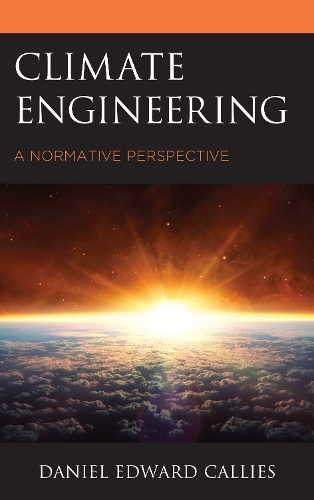
Climate Engineering: A Normative Perspective
(Paperback)
Available Formats
Publishing Details
Climate Engineering: A Normative Perspective
By (Author) Daniel Edward Callies
Bloomsbury Publishing PLC
Lexington Books
4th March 2022
United States
Classifications
Professional and Scholarly
Non Fiction
Environmental policy and protocols
174.9628
Physical Properties
Paperback
210
Width 154mm, Height 219mm, Spine 14mm
277g
Description
Climate Engineering: A Normative Perspective takes as its subject a prospective policy response to the urgent problem of climate change, one previously considered taboo. Climate engineering, the deliberate, large-scale manipulation of the planetary environment in order to counteract anthropogenic climate change, encapsulates a wide array of technological proposals. Daniel Edward Callies here focuses on one proposal currently being researchedstratospheric aerosol injectionwhich would spray aerosol particles into the upper atmosphere to thus reflect a small portion of incoming sunlight and slightly cool the globe.
This book asks important questions that should guide moral and political discussions of geoengineering. Does engaging in such research lead us towards inexorable deployment Could this research draw us away from the more important tasks of mitigation and adaptation Should we avoid risky interventions in the climate system altogether What would legitimate governance of this technology look like What would constitute a just distribution of the benefits and burdens associated with stratospheric aerosol injection Who ought to be included in the decision-making process Callies offers a normative perspective on these and other questions related to engineering the climate, ultimately arguing for research and regulation guided by norms of legitimacy, distributive justice, and procedural justice.
Reviews
This book discusses the ethics and politics of geoengineering, an engineering approach for deliberately manipulating Earth's climate for the purpose of counteracting man-made global warming. Author Callies is currently a postdoctoral scholar at the Institute for Practical Ethics (Univ. of California, San Diego). Specifically, the text focuses on one approach: stratospheric aerosol injection (SAI), which has been proposed as a means to reflect solar radiation back to space and hence to reduce the amount of heat that the Earth receives. Callies advocates support for continued research in this area, but under strict scrutiny of the relevant regulatory institutions. The challenge that this book considers: the ethics behind a particular engineering idea, and whether research on that subject should be encouraged or even allowed, represents a common enough critique that has been applied in many other contexts (as in the case of, for example, gene editing). Still, researchers and professionals interested in climate change may well benefit from the present elaboration of arguments for and against a particular geoengineering idea, considered from the point of view of ethics and world environmental justice. The book reads easily, requires no background to follow, and is supported by state-of-the-art references. Summing Up: Recommended. Graduate students, faculty, and professionals. General readers.
* Choice *Daniel Callies offers a comprehensive and clear discussion of the normative issues in solar radiation management research and governance. He does it with care and enormous sophistication. As policy makers come to terms with the consequences of the weak global response to the urgent need to bring CO2 emissions rapidly down to zero, discussions of climate engineering will grow in frequency and intensity. Callies's book should be the go-to book for the morality of one kind of climate engineering, solar radiation management. It is a truly excellent example of the tools moral and political philosophy applied to one of the most important issues of our time. -- Darrel Moellendorf, Goethe University Frankfurt
This is the book to read if you care about the ethics of geoengineering Daniel Callies dives deep into academic philosophy yet returns with a lucid book that should interest a broad audience. -- David Keith, Harvard University
Author Bio
Daniel Edward Callies is postdoctoral scholar at the University of California, San Diegos Institute for Practical Ethics.
